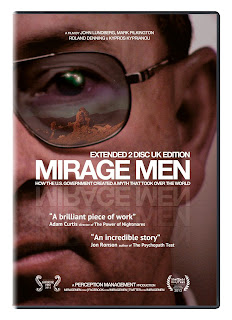Tuesday, 15 July 2014
Mirage Men
A film by Mark Pilkington, Roland Denning, John Lundberg & Kypros Kyprianou
Based on the book by Mark Pilkington
85’ plus extras.
£10 (available here)
I’m not much interested in conspiracy theories or UFOs. Government cover-ups and alien sightings are not my kind of weird. But people who believe the unbelievable definitely are.
In the early fifties, as the Cold War gained momentum, the CIA began to monitor and influence the huge growth in public interest in UFOs.
In the 1980s scientist Paul Bennewitz thought there was a government conspiracy to cover up alien crashes and close encounters. He spied on Kirtland Air Force Base and filmed what he ‘knew’ was UFO activity. He thought he was saving the earth from an alien invasion. What he was actually filming were secret military activities.
It was Richard Doty’s job to mislead the UFO community for the government. He describes himself as a professional liar, so how much what he says in the film can be trusted is open to debate.
Doty was sent in to convince Benn he really did have evidence of aliens, with help from the NSA who went as far as making SFX to convince him. The plan was to discredit him so no one took him seriously and thereby protect what the government was really up to. The targeting of Benn coincided with the development of stealth plane technology.
Doty says he eventually tried to stop Benn who became increasingly paranoid and deluded – not surprisingly. Doty even told Benn (some of) the truth but Benn refused to believe him. Tell a believer the truth and they think it’s a double bluff.
One of Doty’s tactics was to make the believer think they were one of the ‘chosen few’ given access to secret information. William Moore, who was well-respected in the UFO community, thought Benn was being given disinformation but he was getting the truth. The 1947 Roswell crash had been pretty much forgotten by the public until Moore wrote about it, under Doty’s influence.
The disinformation campaign was designed to appeal to prejudices and beliefs. As Doty says, he mixed truth with disinformation to make it more plausible, more appealing. According to Pilkington, belief in aliens and cover-ups is now self-sustaining with little need for government input.
The film interviews people on both sides. There are people who genuinely believe that human evolution has been manipulated by aliens, that the Vatican knows the truth and that cattle mutilations in Dulce, New Mexico in the seventies were done by aliens. Some of them believe the US media has long been used to make the public believe that aliens are purely fictional.
On the other side, there are ex-government agency men who talk about the disinformation campaign – apparently no one in America has to sign any kind of official secrets act.
The psychology of UFO believers and conspiracy theorists is fascinating. These are not stupid people. They are however all male with the exception of Linda Howe, a journalist targeted by Doty. This may be bias in the film-making but footage from conferences does appear to confirm a definite male bias in this particular delusion.
One question the film doesn’t address is why so many people think aliens are targeting the USA. There’s no mention of similar conspiracy theories in other countries for comparison.
The film raises some interesting questions. Was the US government cruel and possibly criminal to manipulate people, sometimes to the verge of a breakdown or were they just protecting national security? Governments have long used propaganda, especially in war time; is feeding belief in aliens any worse than other examples of lying to the public? Are we all entitled to the truth all the time no matter the consequences?
Is it a case of caveat emptor and do gullible people deserve to be taken in? If a government agent offers you ‘secret’ information, would you trust them? Some of the tactics used by Doty and others are pretty funny and, with the exception of Benn, is anyone really harmed?
The film illustrates well how people can become willing accomplices in their own deception. That applies to us all if the right buttons are pushed. We are all only selectively suspicious. Once someone starts believing in something and invests time and energy in it, that belief becomes emotionally weighted and part of identity. This makes it very hard to let go. It’s like admitting a relationship is failing or giving up belief in a god.
Mirage Men is high quality, the interviews with believers, ‘secret’ agents and debunkers are balanced and unbiased. Or is it yet another piece of US government-funded propaganda to misdirect our attention? The truth is out there but once you start to question, be prepared to end up at a conference with a lot of very badly dressed and probably single men. As one conference attendee says: “It must be true – they don’t have conferences about leprechauns”.
Subscribe to:
Post Comments (Atom)

A study of 'abductees' in the US found a significant incidence of childhood abuse that was presumed to be the cause of psychosis. Also, a significant number claimed to have had other weird/unexplainable incidents in their lives, such as ghosts and other apparitions.
ReplyDeleteThe conclusion is that they are either lying or attention seeking (both the same thing really) - it may be a way of expressing suppressed trauma.
The Truth is out there - and it is far more interesting to know the real reasons for the stories than the stories themselves :-D